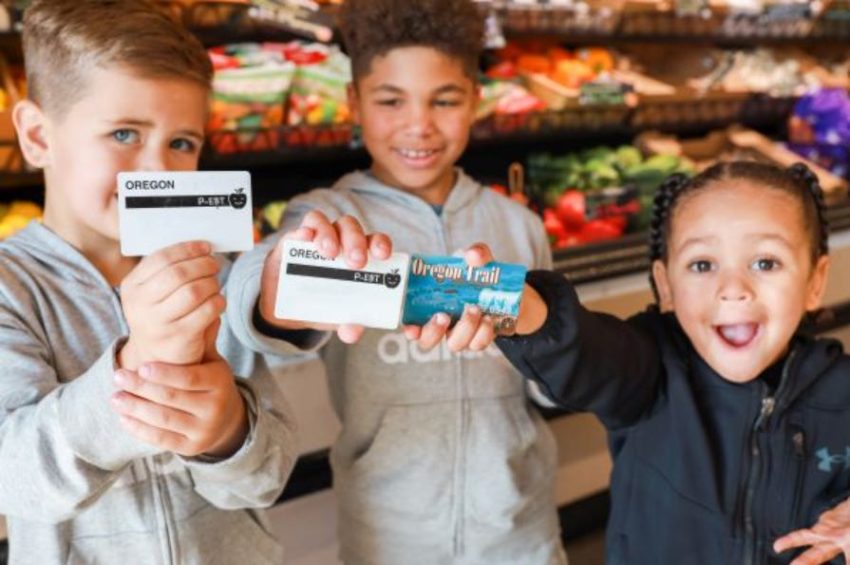EDITOR’S NOTE: Here’s an installment from Tillamook County’s State Representative Cyrus Javadi’s Substack blog, “A Point of Personal Privilege.” Oregon legislator and local dentist. Representing District 32, a focus on practical policies and community well-being. This space offers insights on state issues, reflections on leadership, and stories from the Oregon coast, fostering thoughtful dialogue. Posted on Substack, 10/26/25
When the government turns hunger into political leverage, it crosses from policy failure into moral collapse.
Hunger sucks.
There were days when I went without much food. I took my little sister to the church storehouse every week so we could eat. Later, I worked in soup kitchens, serving people who had nowhere else to go.
Food anxiety isn’t fun. And in the richest country in the world, government shouldn’t be playing around with it.
This week, the U.S. Department of Agriculture, the agency literally tasked with feeding Americans, decided to moonlight as a campaign office. As historian Heather Cox Richardson noted in Letters from an American, the USDA’s own website accused Senate Democrats of refusing to fund food stamps and claimed they were prioritizing “healthcare for illegal aliens and gender mutilation procedures.”
If that sentence reads like it was ghostwritten by a Super PAC intern, that’s because it might as well have been.
Federal websites are supposed to give people facts, not partisan tantrums. But we’ve apparently reached the point where even hunger has to pick a side.
And that, right there, is the story.
The Art of Leverage
The Trump administration has said it won’t tap the $5 billion in reserve funds the USDA keeps for emergencies to cover November’s $9 billion shortfall in SNAP benefits. The reason? Officially, because those reserves might be needed elsewhere. Unofficially, because it makes for good pressure politics.
The kicker is that in an earlier USDA memo, the one released before the shutdown, the department explicitly said those same reserves were meant to be used to keep SNAP running during a lapse in government funding. It even said Congress’s intent was “evident” that the program should continue, and that multi-year contingency funds were available “to ensure that the state can also continue operations during a Federal Government shutdown.”
Now, just weeks later, the USDA says its hands are tied. Same money. Same language. Different politics.
Wow. Just wow.
The government is shut down, Congress is frozen, and more than forty million Americans, many of them children, are staring at the possibility that their EBT cards will read “$0.00” come November 1st.
It’s not the first time Washington has used the poor as leverage. But this time, the gloves are off and the language is nakedly cynical. The administration isn’t just blaming Democrats for the shutdown; it’s warning them that unless they give up demands for healthcare subsidies, they’ll own a national hunger crisis.
The Lie at the Center
And let’s clear something up right now: this shutdown isn’t about healthcare for illegal immigrants.
It’s already illegal for states to use federal Medicaid dollars for people here unlawfully. That’s been true for decades. So think what you may about whether Democrats should or shouldn’t vote for a clean continuing resolution, the bald-faced lies being told by Republicans are astounding, and frankly beneath the party I once belonged to.
And for what? To convince Americans that the pain won’t reach them? To avoid accountability for the policies they’re actually pushing? Why are we cutting Medicaid? Why are we starving people?
Why are people the poker chips we want to bet with?
The Ghost of the Grocery Line
The irony is that SNAP, originally the Food Stamp Program, wasn’t born out of partisanship at all. It was one of the few moments in American history when government, farmers, and grocers actually found common cause.
Back in the Great Depression, farmers had too much food and not enough buyers. Prices collapsed. People went hungry while crops rotted in the fields. The federal government stepped in, first by buying up surplus food, then by distributing it to the poor. The goal wasn’t charity; it was stabilization. Farmers got paid, families got fed, and local grocers stayed open.
It was, at its core, a conservative idea: use markets to serve the public good. A hand up, not a handout. A public-private partnership that recognized that prosperity works best when it’s shared.
Over time, the system evolved, food stamps became EBT cards, poverty programs became economic multipliers. SNAP today feeds 42 million people (about 13,000 people on the north coast and 757,000 people statewide) and supports nearly a quarter-million retailers, the vast majority of which are small businesses.
So when the USDA, under the direction of the Trump administration and its allies in Congress, threatens to shut that spigot off, it’s not just poor families who suffer. It’s the cashiers, the truck drivers, the farmers, and the communities whose economies depend on those dollars circulating.
Hunger doesn’t just empty stomachs; it empties Main Street.
And yes, most SNAP recipients already work. They stock shelves, care for seniors, and clock in at jobs that don’t quite pay enough to cover rent and groceries. They’re not freeloaders; they’re the workforce keeping our towns alive.
I grew up in one of those families. For a while, we depended on assistance too, and not because my parents were lazy. My dad worked hard, paid his child support and then some. My mom worked three jobs a day. Still, I stood in the lunch line with a ticket for a free meal. Without programs like SNAP, we wouldn’t have made it.
Parents like mine deserve honor for not giving up. For doing all they can in a system that’s hard to climb out of, and harder still when politicians keep shaking the ladder for sport.
Weaponizing Dependency
The USDA website isn’t just posting propaganda, it’s telling millions of Americans who rely on it: you’re a pawn in our fight.
Because this time, millions of people’s grocery money is literally being used as ransom. There’s no moral equivalence between political spin and deliberate cruelty.
Republican leaders aren’t even hiding their intent. They’ve been open about it. They are using the shutdown to hold the line on cuts they already passed months ago in H.R. 1 reductions to Medicaid and the rollback of ACA subsidies that help lower-income Americans afford insurance.
Democrats, for their part, have said they won’t vote for a continuing resolution unless those cuts are reversed.
So Republicans have made it an ultimatum: Either vote yes on our terms, or we’ll withhold the money people need for food.
When Republican party leaders claim Democrats are “holding out for illegals and gender surgeries,” it’s just false. And, it’s a distraction from what’s actually on the table: whether to restore healthcare subsidies and Medicaid funding stripped earlier this year.
And as the party in charge, the responsibility is theirs. When you hold the gavel, you don’t get to blame the minority for not fixing your bill. It’s on Republicans to put a funding measure on the floor that can earn the votes to pass.
A Hunger Economy
Food programs have always been moral issues disguised as economic ones. SNAP isn’t just a welfare line in the budget, it’s an economic stabilizer.
Every dollar in SNAP spending generates roughly $1.50 in economic activity.
Even Milton Friedman understood that markets function best when people aren’t starving.
Call it common sense economics, people can’t shop if they’re broke.
And for those worried about waste, the fraud rate in SNAP hovers under two percent. That’s lower than Medicare, lower than defense contracting, and lower than corporate tax fraud.
In other words, if efficiency is the standard, SNAP more than earns its keep.
Also, consider that in 2019, SNAP benefits drove about $56 billion in grocery sales. Of that amount, around 25 percent went to Walmart, but the rest went to tens of thousands of small shops that would close without it.
You don’t have to be a bleeding-heart liberal to see the utility of that. You just have to believe in functioning markets.
Yet here we are, in 2025, arguing not over whether the program works, but whether we should weaponize it. And while we posture, real people like veterans, working parents, and kids are wondering how to stretch a pantry through November.
A bit of irony with your Thanksgiving feast.
I’m sorry, but this isn’t how a serious country behaves.
The Hatch Act and the Hunger Games
The Hatch Act is supposed to stop this kind of behavior, like using government resources for partisan ends. You can’t campaign from a .gov address. You can’t turn federal agencies into mouthpieces. The Department of Agriculture is supposed to be boring. Boring means trustworthy.
When it starts sounding like talk radio, we’ve lost more than decorum. We’ve lost the idea that governing is about stewardship, not domination.
The Real Inflection Point
There’s a line in the USDA statement that accidentally gets it right: “We are approaching an inflection point.”
We are. But not the one they mean.
The inflection point isn’t whether Democrats cave on healthcare subsidies. It’s whether Americans still believe government exists for something larger than humiliating the other team.
Because if feeding the hungry can be turned into a loyalty test, then every program, from Social Security to disaster relief, is fair game.
You don’t have to like big government to see the danger here. The issue isn’t size, it’s sincerity. When leaders stop caring whether policies actually work, we stop being governed and start being managed for effect.
That’s the part that should make everyone nervous. Because hunger is honest. It doesn’t care how you voted.
And, when the fridge is empty, all the rhetoric in the world tastes the same.
The Bottom Line
I knew that long before I ever learned what “SNAP” or “FMAP” meant. It sucked when I was a kid standing in line for free food with my sister. It sucked watching my mom work three jobs and still not have enough. And it still sucks now, only this time, it’s a choice being made in Washington.
We live in a country that grows more food than it can eat, wastes more than it can store, and yet somehow finds new ways to make people go hungry.
That’s not a supply problem. That’s a values problem.
SNAP isn’t perfect. It’s bureaucratic, sometimes clumsy, sometimes misused. But it works. It keeps kids fed, grocers open, and dignity intact. It turns compassion into commerce and hunger into stability.
Feeding people isn’t a partisan project. It’s civilization 101. A government that can subsidize corn, insure banks, and fund wars can also make sure kids eat dinner. That’s not big government; that’s basic decency.
What’s happening now isn’t fiscal restraint. It’s moral decay. Turning food into a weapon doesn’t make government smaller, it makes us smaller.
The people writing press releases about “illegal aliens” and “gender surgeries” aren’t thinking about the families at the church storehouse, or the cashier scanning canned beans at a rural market, or the kid opening an empty fridge.
They’re thinking about leverage. About optics. About winning.
But hunger isn’t leverage. Hunger isn’t a talking point. Hunger just sucks.
And the measure of a serious nation isn’t how cleverly it argues about that, it’s how little it allows it to happen in the first place.
Author’s Note:
Normally, this is the point where I’d ask for your support of my campaign.
But, this week, instead of asking for political contributions, I’m asking for something simpler and more urgent. If you’re able, please consider donating to the Oregon Food Bank or a local pantry in your community.
They’re bracing for higher demand if federal food benefits run dry next weekend, and they’ll be the first line of help for families caught in the middle of this fight.
Politics can wait a week. Hunger can’t.


